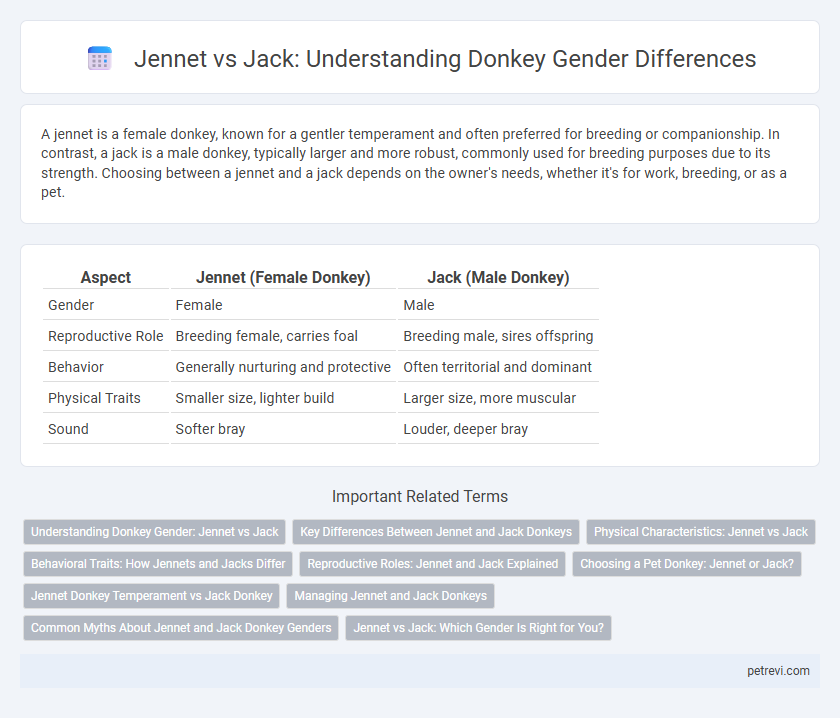A jennet is a female donkey, known for a gentler temperament and often preferred for breeding or companionship. In contrast, a jack is a male donkey, typically larger and more robust, commonly used for breeding purposes due to its strength. Choosing between a jennet and a jack depends on the owner's needs, whether it's for work, breeding, or as a pet.
Table of Comparison
| Aspect | Jennet (Female Donkey) | Jack (Male Donkey) |
|---|---|---|
| Gender | Female | Male |
| Reproductive Role | Breeding female, carries foal | Breeding male, sires offspring |
| Behavior | Generally nurturing and protective | Often territorial and dominant |
| Physical Traits | Smaller size, lighter build | Larger size, more muscular |
| Sound | Softer bray | Louder, deeper bray |
Understanding Donkey Gender: Jennet vs Jack
In donkey gender terminology, a Jennet refers to a female donkey, while a Jack denotes a male donkey. Females, or Jennets, are often valued for breeding and their gentle temperament, whereas Jacks are typically recognized for their role in reproduction due to their robust build and vocal braying. Understanding these distinctions is crucial for effective donkey management and breeding strategies.
Key Differences Between Jennet and Jack Donkeys
Jennet and Jack donkeys differ primarily in gender, with Jennet referring to a female donkey and Jack to a male. Jennets typically exhibit gentler behavior and smaller stature, while Jacks are larger and often more aggressive due to testosterone levels. These physical and behavioral distinctions impact breeding practices and work suitability, making gender a crucial factor in donkey management.
Physical Characteristics: Jennet vs Jack
Jennets are female donkeys typically smaller with a more refined and slender build compared to jacks, which are male donkeys known for their larger size and more muscular, robust frame. Jennets often exhibit a softer facial structure and less pronounced jawline, whereas jacks possess thicker necks and a more prominent crest. Tail and ear size are generally similar, but jacks may have coarser hair texture, reflecting their gender-based physical distinctions.
Behavioral Traits: How Jennets and Jacks Differ
Jennets, female donkeys, tend to exhibit calmer and more sociable behavior, showing greater nurturing instincts compared to jacks, the male donkeys. Jacks often display more territorial and aggressive traits, especially during mating seasons, which influence their interaction with other donkeys and humans. These behavioral distinctions are crucial for managing donkeys in breeding, work, and companion settings.
Reproductive Roles: Jennet and Jack Explained
Jennets are female donkeys primarily responsible for nurturing offspring and contributing to herd growth through reproduction. Jacks, the male donkeys, play a crucial role in mating and passing on genetic traits to maintain strong donkey populations. Understanding the distinct reproductive roles of jennets and jacks is essential for effective donkey breeding and population management.
Choosing a Pet Donkey: Jennet or Jack?
When choosing a pet donkey, understanding the differences between a jennet and a jack is crucial. Jennets are female donkeys known for their gentle temperament and smaller size, making them easier to handle in domestic settings. Jacks, the male counterparts, tend to be larger and more energetic, requiring experienced care and proper management to ensure safe and enjoyable companionship.
Jennet Donkey Temperament vs Jack Donkey
Jennet donkeys, typically female, exhibit a calm and gentle temperament, making them well-suited for companionship and work requiring patience. Jack donkeys, or males, tend to display more assertive and protective behaviors, often characterized by higher energy and territorial instincts. Understanding these temperament differences is crucial for selecting the right donkey based on purpose and handling experience.
Managing Jennet and Jack Donkeys
Managing jennet and jack donkeys requires understanding their distinct behavioral and physiological traits; jennets, being female, tend to be more docile and easier to train, while jacks, male donkeys, often exhibit stronger territorial instincts and require careful handling to prevent aggressive behaviors. Proper diet, regular health check-ups, and secure housing tailored to each gender's needs are crucial for ensuring their well-being and productivity. Implementing specific management practices, such as separating jacks to avoid unwanted breeding and socializing jennets in compatible groups, optimizes their health and reduces stress.
Common Myths About Jennet and Jack Donkey Genders
Common myths confuse Jennet and Jack donkeys solely as female and male, but Jennet actually refers to a female donkey, whereas Jack denotes a male donkey. Misunderstandings arise when people assume all jacks are aggressive or that jennets cannot exhibit typical donkey behaviors like braying or stubbornness. Accurate knowledge of these terms helps clarify gender-specific care and breeding practices within donkey populations.
Jennet vs Jack: Which Gender Is Right for You?
Jennets are female donkeys known for their gentle temperament and smaller size, making them suitable for families and light agricultural work. Jacks, the male donkeys, are typically larger and stronger, often preferred for breeding and heavy-duty tasks. Choosing between a jennet or jack depends on the intended purpose, space availability, and handling experience with equines.
Jennet vs Jack for Donkey Gender Infographic

 petrevi.com
petrevi.com